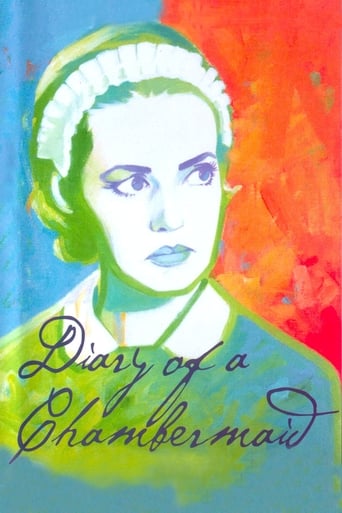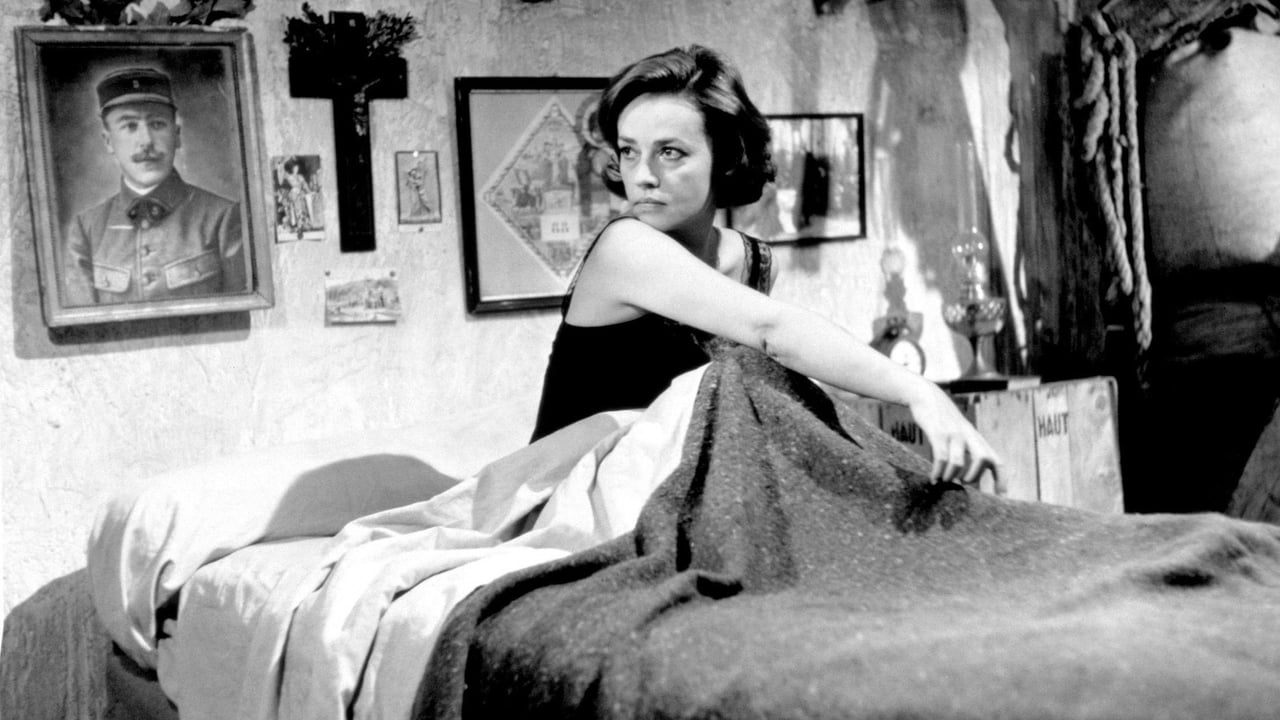evening1
This somewhat aimless film points rather distractedly at many things people do, both good and bad. I am struggling to pull it together for a better sense of what it means, but I am at a loss.Jeanne Moreau plays Celestine, a sensitive and intelligent 32-year- old from Paris who inexplicably goes to the provinces to serve as chambermaid in the country estate of the Monteil family.A sense of foreboding builds as we notice peculiarities in the home. Mme. Monteil's father is a courtly gentleman with a serious shoe fetish. Her husband sustained a brain injury during the war and she rejects him sexually -- so he importunes all of the female help. Worse, we notice that Georges, a sadistic handyman on the estate, is impulsive and cruel toward young Claire, a neglected niece of Mme. Monteil.A terrible crime occurs and Celestine will stop at nothing to see that Georges is hauled off to jail. Later, she marries the childish, anti-Semitic war veteran next door and we are left with an uncomfortable feeling that she is unhappily suspended in time just prior to the establishment of Vichy France.It's an interesting performance by Moreau, but the story evanesces toward the end.A compelling but uncomfortable viewing experience.
Ingrid Flaubert
The film makes an unusual and perceptive study of human morality the situations depicted in the film may be exaggerated and set in another era, but Luis Bruñel manages to strike an easy resonance with us-the viewers.Although the film spends a lot of time showing the bourgeois and their entourage, the film is mainly concerned with the morally ambiguous chambermaid, Célestine (played by Jeanne Moreau) and the strange servant Joseph. The shifting relationship between Célestine and Joseph is constantly surprising and we never really know what either of the characters is playing at. Neither character can claim moral superiority Célestine is ultimately shown to be a spineless opportunist and Joseph a possible murderer.The ending of the film, a sober moment which presages the inevitable rise of fascism in Europe, also sends a shiver down the spine, even if it feels frustratingly disconnected from the rest of the film.
Chris_Docker
Buñuel once said, "Bourgeois morality is for me immoral and to be fought. The morality founded on our most unjust social institutions, like religion, patriotism, the family, culture: briefly, what are called 'the pillars of society'."I mention this, not to alienate people who might find such a statement offensive, but to suggest insight into his point of view. A viewpoint vigorously defended in this anti-bourgeois, rural tale that has a kick like a mule. Buñuel's truths are just as applicable today but, by putting them in 1930s France, he sweetens the bitter pill with a coating of sex, storytelling and the reassuring fiction that 'things have maybe moved on since then.'Célestine impresses us. Intelligent, attractive and sophisticated - but she nevertheless needs to earn her living in service. She takes the train from Paris to work as a chambermaid at a country estate. In this lap of wealth, she deals with a panoply of dodgy people. A brutish handyman. A frigidly overbearing Madame Monteil. Madame's lecherous husband and her kinky father. Remarkably, none of these are portrayed as stereotypes. Characters are well fleshed out as Buñuel pits one against another. Madame Monteil earns our sympathy as she confides sexual shortcomings to the priest, who is in turn well-meaning if hopelessly out of touch. Doddering old Monsieur Rabour, although at first shockingly abhorrent with his fixation on women's feet, probably has nothing more harmful than a shoe fetish. "Would you mind if I touch your calf?" he asks (but goes no further up her leg). Is Célestine playing a dangerous game? Is she a libertine? Or just one step ahead of her audience?The first half of Diary of a Chambermaid is delightful saucy comedy. Buñuel's famed surrealism, that make films like Un Chien Andalou or L'Âge d'Or so formidable, is nowhere to be seen. Nor do we have to grapple with the distanciation of Exterminating Angel, his Brechtian masterpiece of just two years earlier. But be warned, gentle reader. The second half is not only grislier, but by the end Buñuel will have pulled the rug from under your feet. It can be a bleak experience.Quite apart from a clever story, Diary of a Chambermaid offers many delights, both to casual viewers and serious film analysts. Depending on your viewpoint, Moreau's many-sided performance is either a triumph for feminism or stands feminism on its head. It strips bare the bourgeoisie and capitalist, presenting the rising tide of French fascism as xenophobic intolerance - one we can recognise as replicated in many countries or patriotic cults even today. The hypocrisy of the upper classes is one of 'fur coat and no knickers'; whereas the pious protestations of the lower ranks are shown as the facade from which they lust after the coat itself.Class-struggle is mirrored by sex-as-power. To men, sex becomes a celebration of might, whether physical, social or financial. To women, it is the potential to entrap with allure. She is always present and always unattainable. Through this implied promise of sexual gratification she bends men to her will. And still projects an aura of 'purity'. Our handyman tortures a goose before killing it rather horrible, but in a way does it add to his raw animal charm? And is Buñuel really just telling a story? Or is he manipulating his audience to drive the point home?This is also Buñuel's only film made in anamorphic widescreen format. Although not showy, the cinematography is powerful. Credits open to the sound of a rushing steam train. We watch, through Célestine's eyes, the countryside flash by. A wide angle lens increases the sense of movement, as if we are propelled by an unstoppable force.When Joseph tries to kiss Célestine at night by the bonfire, his posture is that of a vampire. A snail crawling across the a dead and violated body in the woods is as vivid and shocking as anything from Buñuel's earlier catalogue of slit eyeballs and dead donkeys. But it is Buñuel's acerbic vision of all that is wrong, in all layers of society, that is so chilling.At one point, Monsieur Rabour is reading the French author JK Huysmans. Huysman's view of the world was as pessimistic as Buñuel, but it is Buñuel that makes it so all-encompassing. The festering fascist mob who cheer for Chiappe in our film, are honouring the same chief of police who prohibited Buñuel's L'Âge d'Or (after fascists destroyed the cinema where it was being shown). There were few governments that liked Buñuel, and we can see that the feeling was mutual.The film is more political than it is entertaining, which may alienate some viewers who start off liking it. Even the title seems cynical I don't recall any suggestion of her keeping a journal. Diary of a Chambermaid is a great vehicle for Moreau, who gets to play so many characters in one. A criticism often levelled at mainstream cinema is that women tend to be decoration in male-driven plots. Célestine (or 'Marie' as she is called in another dig at Catholic - or class - depersonalisation) doesn't so much take over the driving seat as suggest a new perspective from which she is in control. Audiences will divide on whether they ultimately like her or not.Things may have moved on. Domestic service is less harsh in most parts of the world where it survives today. Fascism has been replaced with virulent if not yet such obvious forms of rampant and aggressive nationalism. Sex is not always a game of power. But forces of immorality still pose in white robes and high office. 'Commoners' still aspire to the evils they decry. The purity of a saint is maybe needed to 'enjoy' Diary of a Chambermaid. But Buñuel stood up for his beliefs. Today, most viewers may content themselves with standing up for his cinematic skills.
netwallah
Céléstine (Jeanne Moreau) arrives in her Parisian clothes to take up the position of chambermaid chez Monteil, where things are decidedly strange. The elderly father likes cleanliness and bottines (little boots) on the maid's feet; the daughter is precise and frigid; her husband (Michel Piccoli) is frustrated and robust and distracts himself by hunting and fooling with the female servants. Joseph (Georges Géret), the outdoor servant and carriage driver, is a brute, an almost parodic version of the strong silent type, a man of few words, fond of inflicting pain. He is also a fascist and rabid anti-semite. It's a classic Bunuel scenario. The wealthy, ruling class is decadent and barren; the lower classes are powerless, ignorant, and when not busy being kept down equally busy turning against their own kind. Who are the fascists? People from all classes. Céléstine is an enigmashe dresses too well for a chambermaid, and she keeps her sexuality to herself, complying smilingly with the old master's harmless boot fetish, ignoring the young master's advances, smiling at the flirtatious neighbour, but keeping herself free. When Joseph rapes and slaughters a little girl, Céléstine is determined to bring him to justice, using Joseph's attraction to her to get close to him, trying to extract a confession. Finally, she plants a metal heel-guard or tap from one of his shoes near the site of the murder, and the gendarmes arrest him. But he gets offwhy should we expect justice to work in a corrupt society?and he moves to Cherbourg where he opens a café dedicated to the army and cheers on the fascists as they march in the streets. Céléstine marries the neighbour, a retired captain, and lies in bed as he serves her tea. She seems inert for the first time in the movie. It is a mistake to dismiss this film as a pastiche of country house stereotypes, because Bunuel uses this framework for a bitter indictment of contemporary society, and the cartoon figures serve this purpose well. It is a dark and depressing conclusion, France continuing to fall apart, cruelty and stupidity prevailing, alas.



 AD
AD



